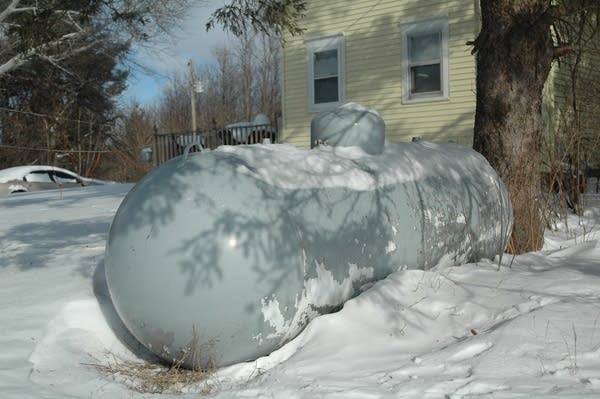Cold is driving up propane prices in Minn.

Go Deeper.
Create an account or log in to save stories.
Like this?
Thanks for liking this story! We have added it to a list of your favorite stories.
Christine McVicker lives in a big 1800s farmhouse in Isanti Township. The house has spotty insulation and copper pipes prone to freezing. Already this month, McVicker has spent almost $1,000 on propane to heat her house.
"You have to keep the furnace running warm enough to keep those pipes warm," McVicker said. "You start running the risk in this kind of weather of your pipes freezing, which we've had happen, than you have a couple thousand dollars in bills from a Saturday night phone call to a plumber to fix the pipes that are pouring water through your ceiling."
Cold weather is driving up prices for propane that's already in short supply in the Upper Midwest, alarming some rural residents who depend on the gas for heating, and forcing the government to scramble to provide some relief.
An analysis this week from the U.S. Energy Information Administration said propane demand has outpaced supply in the Midwest as temperatures fell, with propane inventories dropping by about 12.8 million barrels since Oct. 11.
Turn Up Your Support
MPR News helps you turn down the noise and build shared understanding. Turn up your support for this public resource and keep trusted journalism accessible to all.
Lakes Gas Co. distributes propane primarily for residential heating throughout Minnesota, Wisconsin and the Dakotas. Vice President Steve Sargeant said prices have increased from their typical level of about $1.20 a unit to about $5. And they're still going up.
"This is unforeseen, we've been in business for over 54 years and at no time has the depth of the supply been restricted at the level it is now," Sargeant said.
Trucks that bring propane to the Lakes Gas Co. normally wait two hours at most to fill with propane. Sargeant said they now must travel longer distances to find propane and that trucks are waiting between four and twelve hours just to fill up.
"So many trucks have lined up because everybody is so short," Sargeant said. "When gas becomes available, everybody jumps in line."
Sargeant said Lakes Gas has reduced the amount of propane offered to residents to ensure that supplies are available when needed, which adds another cost because propane tanks then need to be refilled more often.
All the added costs caused by the shortage are putting some economic pressures on the Forest Lake, Minn. company.
"What would be the quickest term solution for us right now, and it sounds silly, is if it would just warm up for the next couple weeks," Sargeant said. "But it's not going to do that, next week is going to be very cold. It's kind of like piling on right now."
State officials have already taken some steps to ease burdens caused by the shortage. Gov. Mark Dayton has lifted restrictions that limited the transportation of propane to certain hours to allow more trucks to bring it to the state.
U.S. Sens. Al Franken and Amy Klobuchar recently announced that the federal spending bill includes $3.4 billion for the Low Income Home Energy Assistance Program (LIHEAP) nationwide, an increase of $169 million from sequester levels.
The state's version of the program helped 147,636 Minnesota households pay for heating last year.
The Minnesota Department of Commerce also announced Thursday that LIHEAP crisis payments for state residents who heat their homes with propane and heating would increase from $500 to $1,000 to help deal with the pinch many residents are feeling from high propane prices.
Commerce Commissioner Mike Rothman said the state of Texas lifted some restrictions on truckers carrying propane at the request of governors in the Midwest so propane can flow north more easily.
Rothman said Minnesota officials are also talking with people in the propane industry to find out why propane prices are rising so dramatically and see if the state can take any actions to help level them out. One area they're looking at is the propane that's being sent out of the country.
"The governor will be...asking the president to look at exports and, if we can, to restrict those," Rothman said. "We're focusing on these problems so we can get them fixed and not have them happen again next year."
In Isanti Township, McVicker has picked up extra shifts at work and cut back expenses at home to pay for the propane heating costs.
"In a normal winter I think we refill it twice, and then we have some left over in the fall," McVicker said. "We just burned three months worth in about a month because it's so cold."
McVicker, who doesn't think she'd qualify for the low-income heating assistance funds, is worried she'll have to refill her propane again in early February if temperatures stay so cold. She doesn't know what she'll do if prices keep going up.



